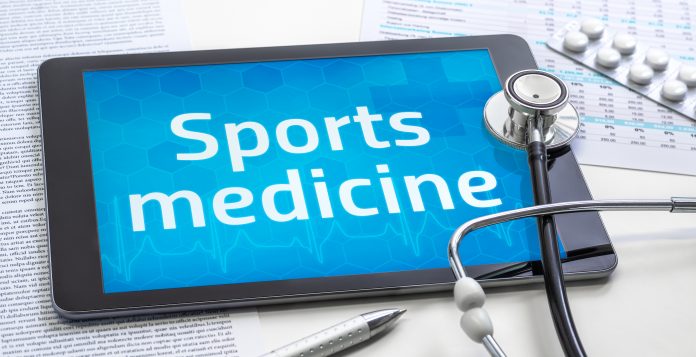Cecilia Van Cauwenberghe from Frost & Sullivan’s TechCasting Group, argues for increasing awareness of the need for scientific research in sports medicine, starting with an overview of international commitment to the health safety of athletes
In 2020, two researchers working at the Department of Family Medicine, Michael G. DeGroote School of Medicine, of the McMaster University, Hamilton in Ontario, Canada, and the Institute of Clinical Medicine of the University of Oslo in Oslo, Norway (Mountjoy and Engebretsen, 2020), published an editorial to depict some athlete health safety initiatives carried out by the leading International Federations based on extensive scientific research.
According to the researchers, a ‘gold standard’ of practice to take care of athletes’ should be utilising sports medicine led by scientific research to determine rule changes. International Federations, including football (FIFA), aquatics (FINA), athletics (IAAF) and skiing (FIS), remarkably invest in scientific research on athlete health safety. The International Olympic Committee (IOC) holds 11 research centres worldwide dedicated to sports medicine. In addition, along with the International Triathlon Union (ITU), the IOC collaborates with academic institutions through the Olympic Solidarity and the IOC Medical and Scientific Commission.
The researchers also emphasise that although some sport rules aim to provide athletes with fair and equitable competition, many others are strictly designed to ensure athlete health safety. The article constitutes a call to action for all International Federations to become more involved in athlete health protection through three primary directives: 1) the introduction of competitive peer-reviewed grant funding processes that will attract top quality sport science researchers; 2) the collaboration of the sports leadership, athletes, coaches and other members of the entourage, to implement targeted sport-specific injury prevention protocols and test these interventions for their efficacy and continuous improvement; 3) the consideration of a Medical Commission representation on the International Federation sport governing boards to ensure that the focus and prioritisation on athlete health are maintained.
Correlating sleep duration & quality with objective athletic performance
An optimal sleep management strategy, according to sport demands
Researchers working at the Sport Injury Prevention Research Centre of the Faculty of Kinesiology and Departments of Pediatrics and Community Health Sciences, Cumming School of Medicine, University of Calgary (Emery et al., 2017) presented a study focused on examining the effectiveness of concussion prevention strategies in reducing concussion risk in sport. The study emphasises the protective effect of helmets in a series of sports, including skiing, snowboarding and hockey.
The Department of Family, Population & Preventive Medicine, Stony Brook Medicine; Program in Public Health, Stony Brook, New York (Kirschen et al., 2020) also investigated the impact of sleep duration on performance among competitive athletes. This approach remarks specifically on the advantage of good sleep for high-performance athletes. According to the authors, although encouraged by most trainers, coaches and sports physicians, there is no optimal path to sleep activity for athletes. The background investigation reveals that it remains a clear and straightforward study for a broad spectrum of sports, capable of exhibiting key performance indicators related to athletic performance metrics, strictly correlated with duration and quality of sleep, beyond circadian and nutritional factors. The researchers performed a systematic review highlighting the relationship between sleep duration and quality with objective athletic performance. The study considered 19 competitive athletes across 12 sports.
Overall, the outcomes illustrated that those sports requiring speed, tactical strategy and technical skill are most sensitive to sleep duration management. In fact, longer-term sleep schemes would affect athletes’ performance more directly than acute sleep strategies. According to the authors, an additional correlation between the demands of the sport and sleep management is essential to determine the optimal behaviour for competitive athletes to achieve high performance. More studies are needed to improve sleep management; however, the study provides robust evidence of its importance to be enhanced in future research.
Mental health in high-performance sport contexts
International consensus statements to guarantee athletes’ safety
A study from the Australasian College of Sport and Exercise Physicians, Melbourne, Australia (Golding et al., 2019) presented solid evidence of the prevalence of depressive symptoms in high-performance athletes. Moreover, the researchers designed a series of tools to evaluate them to prioritise gaps and future research programmes.
Researchers at the Canadian Centre for Mental Health and Sport (CCMHS) presented a position statement about mental health principles in competitive and high-performance sports (Van Slingerland et al., 2019). According to the investigators, the sports culture must evolve significantly to generate a real change for individuals regarding psychological health safety, supportive conduct, and overall sport environments. The authors place mental health in competitive and high-performance sports as a solid base to address current challenges.
The study also sets a solid foundation for a unified mental health perspective, starting with the Canadian sport community. The contribution takes part in the first phase of a multidisciplinary Participatory Action Research (PAR) project in Canada, which aims to design, implement and assess mental health sports strategy in collaboration with a team of 20 stakeholders, community partners and advisors. The study takes some initiatives carried out by the European Federation of Sport Psychology (FEPSAC), which fostered models of mental health care for athletes and trainers in high-performance contexts (Moesch et al., 2018). Precisely in 2018, a consensus statement on Athlete Mental Health was held at the University of Southern Denmark (SDU). The initiative used a Think Tank methodology with a panel of experts from the International Society of Sport Psychology (ISSP), the European Federation of Sport Psychology (FEPSAC), the Association of Applied Sport Psychology (AASP) and the Asian-South Pacific Association of Sport Psychology (ASPASP), as well as national Olympic Committees. Primary results were presented in 2020 (Henriksen et al., 2020).
Final remarks on sports medicine
The awareness of high-performance athletes’ physical, mental, and spiritual health has significantly increased locally and internationally during the past five years. The studies presented here have established robust foundations for future work in these topics.
Sports medicine in Europe focus
The European Federation of Sports Medicine Associations (EFSMA) strongly supports the development and promotion of sports medicine throughout Europe. Their key objective is to protect athletes’ health, while at the same time fight against doping, coming from the firm belief that sport expresses, improves and maintains physical fitness and performance. In addition, the EFSMA believes that sport prevents diseases, creates social relationships and promotes mental health. (1)
The EFSMA points out that the COVID-19 pandemic led to the disruption of organised sport, something they go on to detail in their own words. “Sports activities have now been allowed, as individual sports under certain hygienic conditions and a distance of at least 2 meters is recommended. Concerning the resumption of sport, the main concern is the risk of infection both by a player passing on the COVID-19 virus to others or by becoming infected themselves through physical contact where proximity to other athletes is unavoidable.”
The EFSMA also draws our attention to the fact that professionals in the field of sports and exercise medicine support the performance and health of recreational and elite athletes. “They improve the safety of participation in sports activities by conducting regular medical monitoring and periodical medical Pre-Participation Evaluations (PPE). In order to standardise national variations in the content of evaluation forms for the PPE, the EFSMA Scientific and Educational Commission proposes a PPE gold standard for elite and recreational athletes across Europe,” the EFSMA explain. “Introducing such a medical history and physical examination form, which can be digitally stored, enables a comprehensive international evaluation and an important step towards quality control within Europe,” the EFSMA conclude. (2)
References
Acknowledgements
I want to thank all contributors from the industry involved with developing and delivering this article from Frost & Sullivan.
Further Reading:
- Emery, C.A., Black, A.M., Kolstad, A., Martinez, G., Nettel-Aguirre, A., Engebretsen, L., Johnston, K., Kissick, J., Maddocks, D., Tator, C. and Aubry, M., 2017. What strategies can be used to effectively reduce the risk of concussion in sport? A systematic review. British journal of sports medicine, 51(12), pp.978-984.
- Golding, L., Gillingham, R.G. and Perera, N.K.P., 2020. The prevalence of depressive symptoms in high-performance athletes: A systematic review. The Physician and sportsmedicine, 48(3), pp.247-258. Henriksen, K., Schinke, R., Moesch, K., McCann, S., Parham, W.D., Larsen, C.H. and Terry, P., 2020. Consensus statement on improving the mental health of high performance athletes. International Journal of Sport and Exercise Psychology, 18(5), pp.553-560.
- Kirschen, G.W., Jones, J.J. and Hale, L., 2020. The impact of sleep duration on performance among competitive athletes: a systematic literature review. Clinical journal of sport medicine, 30(5), pp.503-512.
- Moesch, K., Kenttä, G., Kleinert, J., Quignon-Fleuret, C., Cecil, S. and Bertollo, M., 2018. FEPSAC position statement: Mental health disorders in elite athletes and models of service provision. Psychology of Sport and Exercise, 38, pp.61-71.
- Mountjoy, M. and Engebretsen, L., 2020. The application of sport medicine research to protect athlete health and promote athlete performance. Br J Sports Med, 563, p.54.
- Van Slingerland, K.J., Durand-Bush, N., Bradley, L., Goldfield, G., Archambault, R., Smith, D., Edwards, C., Delenardo, S., Taylor, S., Werthner, P. and Kenttä, G., 2019. Canadian Centre for Mental Health and Sport (CCMHS) position statement: Principles of mental health in competitive and high-performance sport. Clinical journal of sport medicine, 29(3), pp.173-180.











